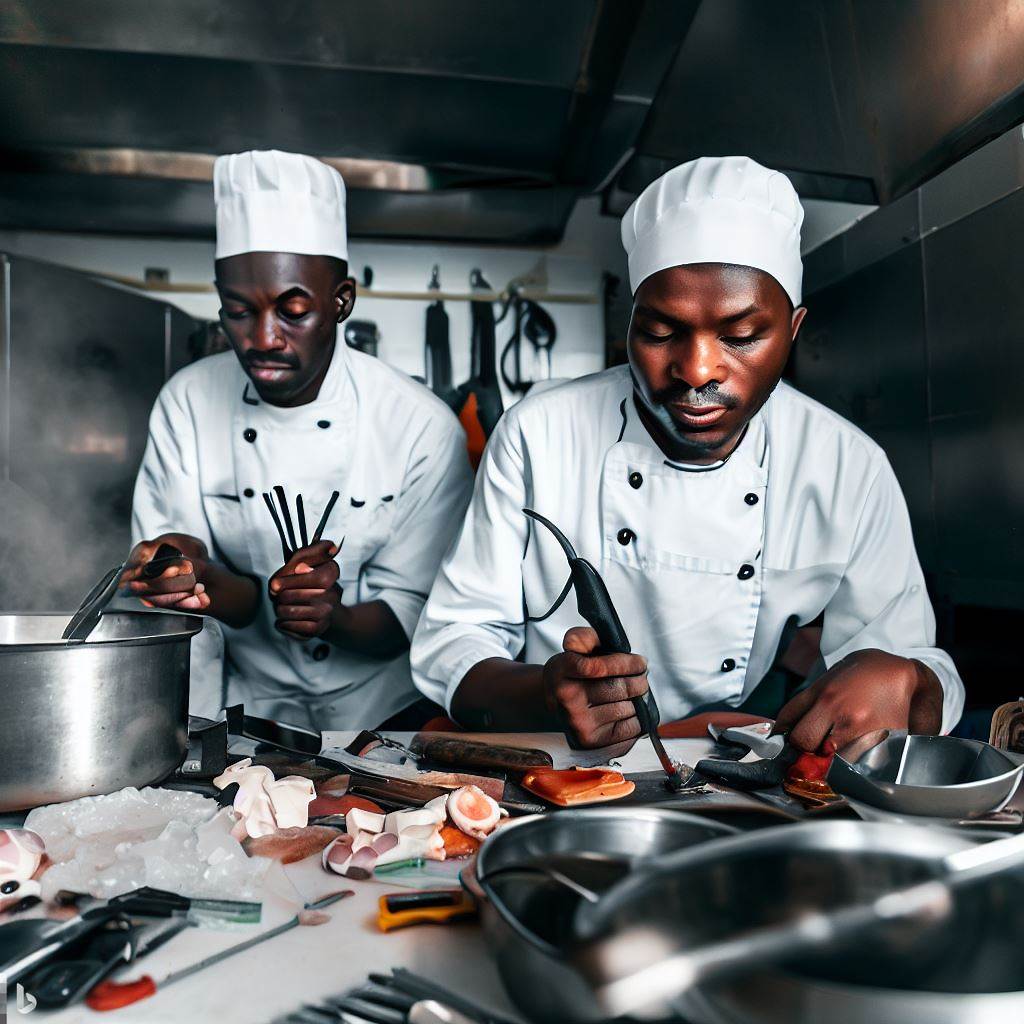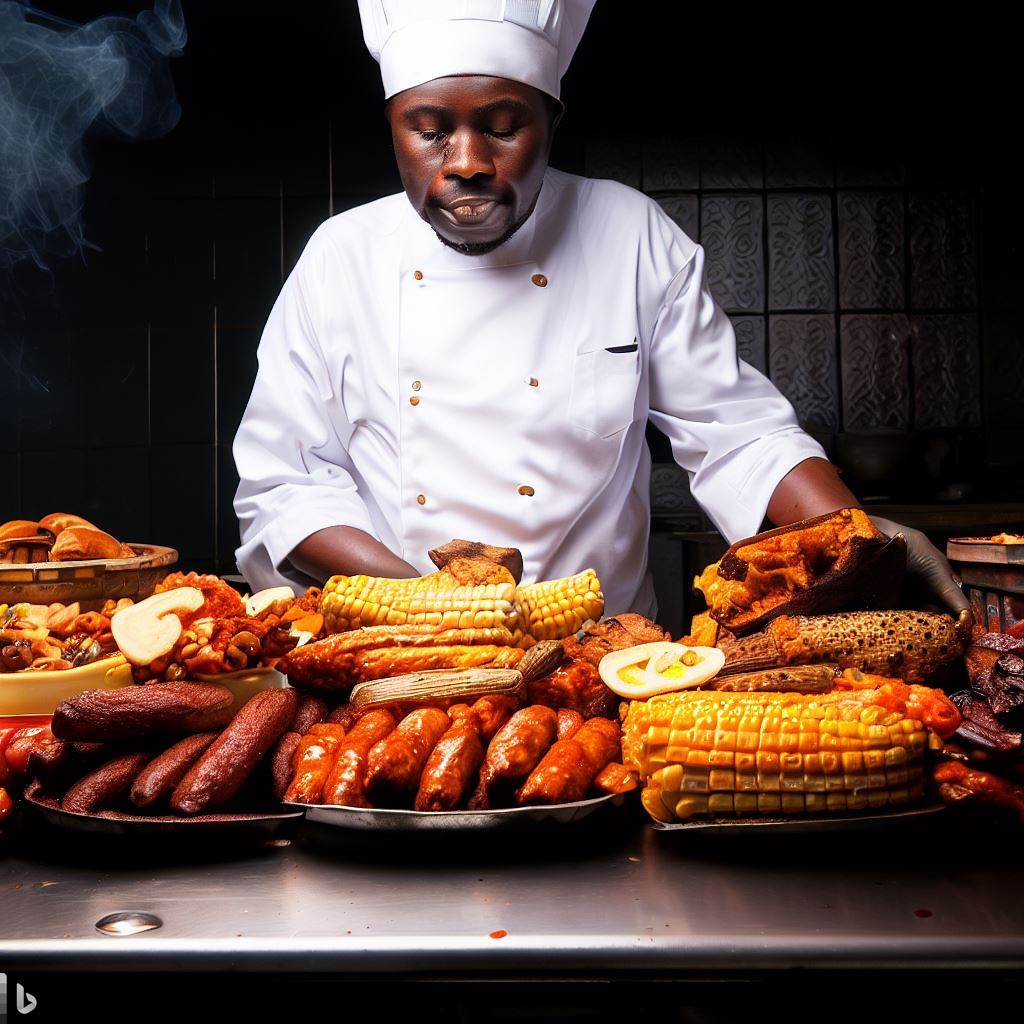Introduction
Tools and equipment play a crucial role in the success of chefs in Nigeria. They are indispensable for various tasks, ranging from food preparation to presentation.
Without these tools, chefs would struggle to create delicious and visually appealing dishes.
The Importance of Tools and Equipment for Chefs in Nigeria
Tools and equipment are vital for chefs in Nigeria as they enhance their efficiency and productivity in the kitchen.
They enable chefs to perform tasks with precision, saving time and effort.
These tools also contribute to food safety by ensuring proper handling and preparation.
Essential Tools and Equipment for Chefs in Nigeria
- Knives: A chef’s knife, utility knife, and paring knife are must-haves for precise cutting and chopping.
- Cutting Boards: These provide a clean and stable surface for chopping ingredients, reducing cross-contamination.
- Cookware: Essential items include pots, pans, and baking sheets for cooking, frying, and baking.
- Mixing Bowls: These enable chefs to mix ingredients, marinate meat, and prepare sauces.
- Measuring Tools: Accurate measurements are crucial for recipe consistency, necessitating measuring cups and spoons.
- Utensils: Chefs require spatulas, tongs, whisk, ladle, and other tools for stirring, flipping, and serving.
- Kitchen Appliances: Blender, food processor, and stand mixer aid in blending, grinding, and mixing.
- Thermometer: Ensuring food is cooked at the right temperature is vital, especially for meat and baked goods.
- Chef’s Apron and Hat: These traditional garments protect chefs’ clothing while maintaining a professional appearance.
Tools and equipment are indispensable for chefs in Nigeria, enabling them to excel in their day-to-day culinary activities.
From knives to cookware and measuring tools, each item plays a crucial role in creating delicious meals, maintaining food safety, and enhancing efficiency in the kitchen.
Basic Tools for Chefs
When it comes to being a chef in Nigeria, having the right tools and equipment is essential for success in the kitchen.
In this section, we will explore the basic tools that every chef should have, including knives, cutting boards, measuring tools, and mixing bowls.
Knives
- There are different types of knives that chefs use, such as chef’s knives, paring knives, and serrated knives.
- Each knife has its own specific use, from chopping and slicing to peeling and trimming.
- A good quality knife set is important for chefs as it allows for precise and efficient cutting.
Cutting Board
- Choosing the right material for a cutting board is crucial, such as wood, plastic, or bamboo.
- Proper maintenance and cleaning of a cutting board is necessary to prevent cross-contamination.
Measuring Tools
- Accurate measurements are important in cooking to ensure the right balance of ingredients.
- Common measuring tools include spoons, cups, and scales, which all serve different purposes.
Mixing Bowls
- Mixing bowls come in different sizes and materials, such as stainless steel, glass, and plastic.
- They are used for mixing ingredients, marinating, and storing prepped ingredients during food preparation.
Having the right tools and equipment is crucial for chefs in Nigeria.
Knives are essential for precise cutting, with different types serving specific purposes. A good quality knife set is a valuable investment.
Choosing the right material for a cutting board is important to ensure safety and hygiene in the kitchen.
Maintaining and cleaning the cutting board properly is necessary to prevent bacteria growth.
Accurate measurements in cooking are crucial, and different tools like spoons, cups, and scales serve this purpose.
Mixing bowls come in various sizes and materials, used for mixing ingredients and storing prepped ingredients during cooking.
Read: Digital Curation in Nigeria: A Modern Take on Tradition
Essential Equipment for Chefs
Stove and Oven
A stove and oven are fundamental tools in any kitchen.
In Nigeria, there are several types of stoves and ovens commonly used. These include gas stoves, electric stoves, and dual-fuel stoves.
Chefs should consider the type that suits their cooking style and preferences.
Additionally, energy-efficient options should be considered to reduce electricity consumption and promote
Types of stoves and ovens commonly used in Nigeria
When it comes to cooking in Nigeria, a range of stoves and ovens are widely utilized.
Gas stoves are a popular choice, offering quick heating and precise temperature control.
Charcoal stoves remain prevalent, especially in rural areas, due to their affordability and accessibility.
Electric stoves are gaining popularity, providing convenience and cleaner cooking options for urban households.
Traditional wood-burning stoves, although less common nowadays, are still used in some regions for their rustic charm.
In recent years, induction cooktops have made their way into Nigerian kitchens, known for their energy efficiency and safety features.
Clay ovens, often seen in local bakeries, produce mouthwatering bread and pastries.
With a diverse range of stoves and ovens available in Nigeria, cooking methods vary from region to region, showcasing the country’s rich culinary traditions.
Energy-efficient options
Refrigerator
Proper food storage is crucial in maintaining the freshness and quality of ingredients.
Chefs should invest in a reliable refrigerator that can keep their perishable items fresh for a longer period.
When choosing a refrigerator, several factors should be considered.
These include capacity, energy efficiency, temperature control, and additional features such as adjustable shelves and a freezer compartment.
Importance of proper food storage
Proper food storage is paramount for preserving freshness, taste, and nutritional value. It prevents spoilage and waste.
Storing food correctly ensures safety by minimizing the risk of harmful bacteria growth, which can cause foodborne illnesses.
Refrigerators maintain the ideal temperature for perishables, keeping them from deteriorating quickly.
Freezing extends the shelf life of various items, such as meats, fruits, and vegetables, for months.
Sealed containers protect against moisture and pests, maintaining food quality for longer durations.
Organizing your pantry and fridge helps you quickly locate items, reducing the chances of food going bad unnoticed.
Labeling and dating items ensure you use the oldest ones first, reducing waste and saving money.
Proper food storage reduces your grocery bills and helps you make the most of your resources.
understanding and practicing proper food storage is crucial for health, safety, and economic reasons.
Factors to consider when choosing a refrigerator
When selecting a refrigerator, start by measuring your space.
Assess your family’s size and needs for storage capacity.
Consider your budget and energy efficiency preferences. Evaluate features like ice makers and water dispensers.
Think about the refrigerator’s layout and organization options. Examine the door swing direction for space suitability.
Check for adjustable shelves and storage compartments. Assess the noise level and choose a quiet model if needed.
Look for energy-efficient models with high Energy Star ratings. Research the brand’s reputation and read customer reviews.
Don’t forget to factor in the refrigerator’s warranty and customer service.
Lastly, compare prices and deals from multiple retailers before making your final decision.
Cookware and Bakeware
Chefs require a range of cookware and bakeware to prepare diverse dishes. From pots and pans to baking pans, each type serves a specific purpose in cooking.
It is important to have a variety of sizes and types of pots and pans to accommodate different cooking techniques.
Additionally, chefs can choose between non-stick cookware and traditional options.
Non-stick cookware allows for easy food release and effortless cleaning, making it a preferred choice for many chefs.
Types of pots, pans, and baking pans
In the realm of culinary tools, pots, pans, and baking pans stand as vital assets.
- Pots, with their versatile nature, are perfect for simmering soups, cooking pasta, and preparing stews.
- Frying pans, often called skillets, excel in searing meats and sautéing veggies to perfection.
- Cast iron skillets, prized for their durability, evenly distribute heat for a perfect sear or a mouthwatering frittata.
- Saucepans are the go-to for delicate sauces, reheating leftovers, and boiling a quick cup of tea.
- Woks, a staple of Asian cuisine, offer high sides for stir-frying and deep frying with ease.
- Baking pans, like cookie sheets, muffin tins, and cake pans, cater to sweet and savory creations alike.
- Roasting pans, designed for meats, yield succulent roasts and mouthwatering gravy.
- Dutch ovens, versatile and sturdy, transition seamlessly from stove to oven for braises and bread baking.
In your culinary journey, these pots, pans, and baking pans await, ready to elevate your dishes to new heights.
Food Processor/Blender
Having a good quality blender offers numerous benefits to chefs in Nigeria.
Food processors have different functions and can be used for various tasks in the kitchen.
Having the right tools and equipment is essential for chefs in Nigeria to efficiently prepare delicious meals.
In this section, we will discuss the essential equipment that every chef should have in their kitchen.
Benefits of having a good quality blender
A high-quality blender revolutionizes your kitchen, making meal prep a breeze. It effortlessly pulverizes tough ingredients, such as ice and fibrous greens.
With its powerful motor and sharp blades, it creates silky-smooth smoothies, soups, and sauces in seconds. This efficiency saves you valuable time on busy mornings.
The durability of a good blender ensures it lasts for years, providing an excellent return on your investment. Say goodbye to frequent replacements!
Moreover, these blenders are versatile, capable of handling various culinary tasks like nut butter, salsa, and even dough. Their adaptability expands your culinary horizons.
Cleaning becomes a breeze as most high-end blenders have removable, dishwasher-safe parts. No more tedious scrubbing or hard-to-reach crevices.
Last but not least, they often come with generous warranties, offering peace of mind.
A good blender isn’t just an appliance; it’s a kitchen ally that enhances your culinary experience.
Different functions and uses of food processors
Food processors are culinary multi-tools. They slice, dice, and chop ingredients precisely, saving time and effort.
Pureeing vegetables for soups or sauces is effortless with a food processor’s power and efficiency.
These machines also excel at grating cheese or vegetables in seconds, making meal prep a breeze.
Need a quick dough? Food processors knead dough with ease. They’re essential for bakers. Nut butters are a cinch, too.
Just blend your favorite nuts to perfection. Many processors come with additional attachments, like citrus juicers or dough blades, broadening their utility.
Food processors shine in creating dips and spreads, from creamy hummus to chunky salsas. They’re also great for making homemade pesto or mayo.
Experiment with desserts—whip up no-bake cheesecakes or cookie dough effortlessly.
Cleaning is simple; most parts are dishwasher safe. Food processors simplify cooking and offer endless culinary possibilities A must-have kitchen appliance!
the right tools and equipment are imperative for chefs in Nigeria to excel in their culinary endeavors.
From stoves and ovens to refrigerators, cookware, and blenders, each equipment serves a specific purpose in the kitchen.
By investing in high-quality and energy-efficient options, chefs can ensure optimal performance and create delightful dishes for their customers or loved ones.
Read: Nigeria’s Curator Job Market: Trends and Opportunities

You Might Also Like: How to Become a Political Scientist in Nigeria: Steps
Specialized Tools and Equipment
pastry Tool
- Rolling pins
- Pastry brushes
- Molds
Importance in baking and pastry making
Pastry chefs, in particular, understand the importance of using the right tools to achieve the perfect pastry.
Rolling pins, pastry brushes, and molds are essential in creating various pastry doughs and decorations.
The rolling pin helps in flattening dough to the desired thickness, while the pastry brush is used to apply egg wash or glaze.
Molds provide the desired shapes for tarts, cookies, and cakes. Without these tools, pastry making would be difficult and the final product may not turn out as expected.
Grill and BBQ Equipment
Grilling and BBQ are popular cooking methods in Nigeria, especially during social gatherings and festivities.
To achieve the best grilling results, chefs rely on different types of grills and BBQ equipment.
These equipment come in various features such as temperature control, smoke generation, and grilling surface.
Charcoal grills, gas grills, and electric grills are commonly used.
Publish Your Professional Profile, Business or Brand
Showcase your expertise, gain trust, and boost visibility instantly on Professions.ng.
Publish NowThey provide the necessary heat and smoky flavor to enhance the taste of grilled meats and vegetables.
Chefs also employ techniques like direct grilling, indirect grilling, and smoking to achieve different flavors and textures.
Types and features of grills and BBQ equipment
In Nigeria, grilling enthusiasts savor an array of equipment, each with unique features and advantages.
Portable charcoal grills offer convenience for picnics and outdoor gatherings. Gas grills, on the other hand, provide rapid heating and precise temperature control.
The traditional open-fire pit remains a beloved choice, allowing a smoky flavor infusion.
In recent years, electric grills have gained popularity for their ease of use and quick cleanup. Kamado grills, inspired by Japanese design, are renowned for their versatility and excellent heat retention.
Additionally, pellet grills offer automated cooking with wood pellet infusions, enhancing flavor profiles.
For those seeking a taste of authentic Nigerian barbecue, horizontal smokers are ideal for slow-cooked meats with a rich, smoky essence.
Offset smokers, commonly used in Texas-style barbecue, are also embraced by Nigerian pitmasters.
Nigerian BBQ enthusiasts can choose from a diverse range of grills, ensuring a delicious outdoor cooking experience.
Popular grilling techniques in Nigeria
Nigeria’s grilling techniques sizzle with diversity. In villages, open flame pits dominate. Skewered meats tantalize palates.
Seasonings vary widely, from suya’s spicy peanut blend to grilled fish with aromatic spices. Marination is key.
Local woods like acacia infuse unique flavors. Grilled plantains and yams add delightful sides. The grill becomes a culinary canvas.
Charcoal grills, especially in cities, offer a convenient alternative. Kebabs and skewers are street food favorites.
Mouthwatering aromas fill the air as meats sizzle. It’s a communal experience, with friends and family gathering around.
Nigerian grilling is more than just cooking it’s a celebration of flavors, traditions, and togetherness. Explore, enjoy, and savor.
Specialized Utensils
Cooking is an art that requires precision and the right tools and equipment to bring out the best flavors and textures in dishes.
In Nigeria, chefs rely on specialized tools and equipment to create delicious meals that satisfy their customers’ palates.
In addition to specialized tools and equipment, chefs also make use of specialized utensils that aid in specific cooking tasks.
Tongs, ladles, and spatulas are among the most commonly used utensils in the kitchen. Tongs are versatile tools that can be used to grip, flip, and transfer food items with ease.
Ladles are essential for portioning soups, sauces, and stews, ensuring consistent serving sizes. Spatulas, on the other hand, are perfect for flipping delicate items like pancakes and omelets.
These utensils help chefs maneuver food items with precision and efficiency.
Read: Skills Needed to Thrive as a Curator in Nigeria
Maintenance and Care Tips for Tools and Equipment
Are your culinary tools losing their shine? Fear not, here are some tips for maintaining them:
- Sharpen Knives Regularly: Dull knives can be dangerous. Use a honing rod or sharpening stone for a razor-sharp edge.
- Hand Wash Your Knives: Avoid the dishwasher, as it can damage blades and handles over time.
- Clean Cutting Boards: Scrub wooden boards with salt and lemon to remove stains and odors.
- Cast Iron Love: Season your cast iron pans to prevent rust and maintain non-stick properties.
- Stainless Steel Shine: Polish stainless steel with a mixture of baking soda and water for a sparkling finish.
- Keep Pots and Pans Dry: Moisture can lead to rust, so make sure your cookware is thoroughly dried.
- Store Utensils Properly: Hang them to prevent damage and make them easily accessible.
- Regularly Inspect for Damage: Check for loose handles, bent utensils, or chipped blades and replace as needed.
- Stay Organized: A clutter-free kitchen is easier to maintain, so organize your tools for quick access.
- Handle with Care: Treat your culinary tools with respect, and they will serve you well for years to come.
Proper cleaning and storage Techniques
In the world of culinary arts, cleanliness reigns supreme. It ensures food safety and enhances the flavor of your creations. Begin by washing your hands thoroughly.
Next, sanitize all surfaces and utensils.
For cutting boards, use hot, soapy water, and scrub vigorously.
Dry them with a clean cloth or paper towel. Knives demand special attention—sharpen them regularly to maintain their efficiency.
Storage matters too.
Keep perishables in the fridge, tightly sealed to prevent cross-contamination. Label containers with dates to track freshness.
Freezer items should be double-wrapped to avoid freezer burn.
Spices? Store them in a cool, dark place, away from moisture and heat. Dry goods like flour and grains should go in airtight containers.
Organize your pantry to use the oldest items first.
Remember, mastering proper cleaning and storage techniques is the foundation of culinary success.
It ensures not only delectable dishes but also the safety of your patrons.
Regular maintenance to extend the lifespan
Maintaining culinary equipment is pivotal.
Neglecting it reduces its lifespan, hampers efficiency, and inflates operational costs.
To begin, clean your equipment daily. Use appropriate detergents and brushes to remove grease and food residues.
Furthermore, inspect for wear and tear regularly.
Look for loose bolts, frayed wires, or damaged components. Address issues promptly.
Don’t forget about lubrication.
Properly lubricate moving parts to prevent excessive friction, which can lead to breakdowns.
Calibrate your equipment periodically.
Temperature, pressure, and timing settings should be accurate to ensure consistent results.
Replace worn-out parts immediately. Delaying replacements can result in more significant damage and higher repair costs.
Lastly, schedule professional maintenance regularly. Certified technicians can identify and fix potential problems before they escalate.
By following these simple steps, you’ll extend the lifespan of your culinary equipment and ensure its smooth operation.
Importance of following manufacturer’s instructions
When it comes to culinary tools, adhering to manufacturer’s instructions is paramount.
Neglecting guidance risks safety.
Each tool’s design and functionality require specific handling, Ignoring instructions may lead to accidents.
Manufacturers conduct extensive research to ensure optimal performance.
Disregarding their advice may result in subpar outcomes.
Maintenance guidelines prolong tool lifespan, Ignoring these can lead to premature wear and tear.
Moreover, warranty coverage often hinges on proper usage.
Not following instructions may void warranties.
In precision cooking, accuracy is essential, manufacturers’ recommendations aid in achieving precision.
Safety, quality, and longevity—all linked to compliance with instructions, Culinary success starts with following the manufacturer’s guidance.
Read: Challenges Faced by Curators in Nigeria’s Museums
Conclusion
Tools and equipment play a crucial role in the success of chefs in Nigeria.
They not only enhance the cooking experience but also contribute to the overall quality of dishes.
It is important for chefs to invest in high-quality tools to ensure efficiency and effectiveness in their work.
By using the right equipment, chefs can save time and effort in the kitchen, allowing them to focus on creating delicious and visually appealing dishes.
Continuous learning and exploration of new tools and equipment can further enhance their cooking experiences and keep them updated with the latest trends in the culinary world.
As the culinary industry in Nigeria continues to evolve, chefs must stay adaptable and embrace new technologies and techniques that can help them excel in their profession.




